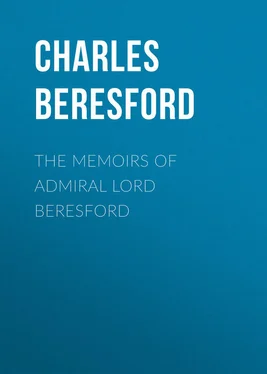Charles Beresford - The Memoirs of Admiral Lord Beresford
Здесь есть возможность читать онлайн «Charles Beresford - The Memoirs of Admiral Lord Beresford» — ознакомительный отрывок электронной книги совершенно бесплатно, а после прочтения отрывка купить полную версию. В некоторых случаях можно слушать аудио, скачать через торрент в формате fb2 и присутствует краткое содержание. Жанр: foreign_antique, foreign_prose, на английском языке. Описание произведения, (предисловие) а так же отзывы посетителей доступны на портале библиотеки ЛибКат.
- Название:The Memoirs of Admiral Lord Beresford
- Автор:
- Жанр:
- Год:неизвестен
- ISBN:нет данных
- Рейтинг книги:5 / 5. Голосов: 1
-
Избранное:Добавить в избранное
- Отзывы:
-
Ваша оценка:
- 100
- 1
- 2
- 3
- 4
- 5
The Memoirs of Admiral Lord Beresford: краткое содержание, описание и аннотация
Предлагаем к чтению аннотацию, описание, краткое содержание или предисловие (зависит от того, что написал сам автор книги «The Memoirs of Admiral Lord Beresford»). Если вы не нашли необходимую информацию о книге — напишите в комментариях, мы постараемся отыскать её.
The Memoirs of Admiral Lord Beresford — читать онлайн ознакомительный отрывок
Ниже представлен текст книги, разбитый по страницам. Система сохранения места последней прочитанной страницы, позволяет с удобством читать онлайн бесплатно книгу «The Memoirs of Admiral Lord Beresford», без необходимости каждый раз заново искать на чём Вы остановились. Поставьте закладку, и сможете в любой момент перейти на страницу, на которой закончили чтение.
Интервал:
Закладка:
"CHARLIE BERESFORD"
I received in reply a severe but affectionate reproof from my father.
The gentlemen of the Press took upon themselves to improve the occasion, having first taken care, of course, to describe the affair as a great deal worse than it was. "Let this lesson be taken," says one kind journalist, "it may be a guide and a warning for the future. The days are gone – gone for ever – when the pranks of a Waterford would be tolerated; but while we would hope his follies are lost, we would likewise hope that his manly, frank, chivalrous nature is still inherited by his kinsmen."
Another reporter did me the justice to record that, on being called on for my defence, I said: "I certainly do apologise if I did strike the lady, because it was not my intention to do so; but I certainly don't apologise for striking Mr. Yates." I trust he bears me no malice.
Yet another guardian of public morals observed that "his Worship, in announcing the penalties, called attention to the inequalities of the law, which exacted fines for the same offence alike from the man with whom sovereigns were plentiful as hours and the man whose night's spree must cost him a week's fasting." Had his Worship taken the trouble to refer to the scale of pay granted by a generous country to midshipmen, comparing it with the scale of rations and the price we paid for them, and had he (in addition) enjoyed the privilege of perusing the financial clauses of the letter addressed to me more in sorrow than in anger by my father, he might perhaps have modified his exordium.
As an illustration of the strict supervision exercised by the senior officers, I may record that I received – in addition to my other penalties and visitations – a severe reproof from Captain Stewart, my old captain in the Marlborough .
The Channel Fleet visited Teneriffe. It was the first iron fleet ever seen in the West Indies.
In the cutting-out action off Teneriffe, Nelson lost his arm, and several ensigns of the British boats were captured by the French. Ever since, it has been a tradition in the Navy that the flags ought to be recaptured. A party of bluejackets did once succeed in taking them from the cathedral and carrying them on board; but the admiral ordered their restoration. They were then placed high up on the wall, out of reach, where I saw them. We held a meeting in the gun-room of the Defence to consider the best method of taking the flags. But the admiral, who was of course aware that all junior officers cherished the hope of recovering the relics, issued orders that no such attempt was to be made.
I was invited by an old friend of my father, a religious old gentleman living in Cornwall, to a couple of days' rabbit-shooting. I was overjoyed at the opportunity, and was the object of the envy of my brother midshipmen. Arriving after lunch, I was brought into the great room where the old gentleman was sitting in an arm-chair, with his feet, which were swathed in masses of cotton-wool, resting on gout-rests. Near him was a turn-table laden with books.
"Don't come near me, my boy," he shouted, as I entered. "I am very glad to see you, but don't come near me. I have a terribly painful attack of gout, the worst I ever had in my life. Go and sit down on that chair over there."
With the breadth of the polished floor between us, we chatted for a while; and then the old gentleman, pointing to the table of books, asked me to give him a particular volume.
"Now be very careful," said he.
Full of ardour, delighted to think that I should now escape to the keeper and the rabbits, I jumped up, ran to the table, my foot slipped on the parquet, and I fell face forward with my whole weight upon the poor old man's feet, smashing both foot-rests. The agonising pain shot him into the air and he fell on my back. I have never heard such language before or since. As he rolled off me, he shouted:
"Ring the bell, you – !"
In came the butler.
"Take that – out of my house! Send him back to his – ship! Never let me see his – face again!" screamed my host.
So I departed in the dog-cart. It was many a long day ere I heard the last of my rabbit-shooting from my messmates.
A few months afterwards, when I had been less than a year in the Defence , Rear-Admiral Charles Eden appointed me to the Clio as senior midshipman. He said he wanted me to learn responsibility.
The New Ships . – The predecessors of the Defence and her class were wooden vessels plated with iron armour. The first iron-built, armoured, sea-going British vessel was the Warrior , launched in 1860. She was laid down in the previous year, in which Lord Charles Beresford entered the Navy. Several wooden ships ( Royal Oak , Caledonia , Prince Consort , Ocean , Royal Alfred , Repulse , Favorite , Research ) were converted into armoured ships during their construction. These were launched from 1862 to 1864. For some years the Admiralty built wooden armoured ships and iron armoured ships simultaneously. From 1860 to 1866, ten iron-built, armoured, sail and steam ships were launched: Warrior , Black Prince , Defence , Resistance , Hector , Achilles , Valiant , Minotaur , Agincourt , Northumberland . In 1864 and 1865, five wooden-built, armoured ships were launched: Lord Clyde , Lord Warden , Zealous , Pallas , Enterprise . The Royal Sovereign , launched in 1857 as a wooden line-of-battle ship, was converted in 1862 to an armoured vessel and was equipped with four turrets. She was thus the first turret-ship in the British Navy. The next step was to group the guns in a central armoured battery, and to belt the ship with armour along the water-line. At the same time, more turret-ships were constructed. Earnest controversy was waged among naval authorities as to what were the most important qualities of the fighting ship, to which other qualities must be partially sacrificed; for, broadly speaking, all warships represent a compromise among speed, defence and offence – or engines, armour and guns. The controversy still continues. The disaster which befell the Captain decided, at least, the low-freeboard question in so far as heavily rigged sailing steam vessels were concerned, for the Captain, a rigged low-freeboard turret-ship, capsized on 6th September, 1870. ( The Royal Navy , vol. i., Laird Clowes.)
Lord Charles Beresford, entering the Navy at the beginning of the changes from sails to steam, from wood to iron, and from iron to steel, learned, like his contemporaries, the whole art of the sailing ship sailor, added to it the skill of the sailor of the transition period, and again added to that the whole body of knowledge of the seaman of the New Navy. He saw the days when the sailing officers hated steam and ignored it so far as possible; as in the case of the admiral who, entering harbour under steam and sail, gave his sailing orders but neglected the engineer, and so fouled the wharf, and said, "Bless me, I forgot I was in a steamship!"
Admiral Penrose Fitzgerald, who entered the Navy five years before Lord Charles Beresford, describes the transitional period in his Memories of the Sea . Speaking of the Hercules , one of the new central-battery, armoured-waterline ironclads, to which he was appointed first lieutenant when she was first commissioned in 1868, Admiral Fitzgerald writes: – "The Hercules was the most powerful ironclad afloat, in this or any other country. She carried 18-ton guns – muzzle-loaders – and nine inches of armour, though this was only in patches; but she had a good deal of six-inch armour, and her water-line and battery were well protected, as against ordnance of that date. She was full-rigged, with the spars and sails of a line-of-battle ship, and she could steam fourteen knots – on a pinch, and could sail a little . In fact she was the masterpiece of Sir Edward Reed's genius.
Читать дальшеИнтервал:
Закладка:
Похожие книги на «The Memoirs of Admiral Lord Beresford»
Представляем Вашему вниманию похожие книги на «The Memoirs of Admiral Lord Beresford» списком для выбора. Мы отобрали схожую по названию и смыслу литературу в надежде предоставить читателям больше вариантов отыскать новые, интересные, ещё непрочитанные произведения.
Обсуждение, отзывы о книге «The Memoirs of Admiral Lord Beresford» и просто собственные мнения читателей. Оставьте ваши комментарии, напишите, что Вы думаете о произведении, его смысле или главных героях. Укажите что конкретно понравилось, а что нет, и почему Вы так считаете.












